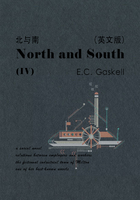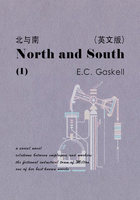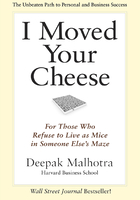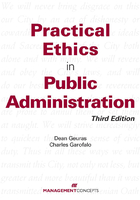A frequently recurring doubt, whether Mr Pancks's desire to collect information relative to the Dorrit family could have any possible bearing on the misgivings he had imparted to his mother on his return from his long exile, caused Arthur Clennam much uneasiness at this period. What Mr Pancks already knew about the Dorrit family, what more he really wanted to find out, and why he should trouble his busy head about them at all, were questions that often perplexed him. Mr Pancks was not a man to waste his time and trouble in researches prompted by idle curiosity. That he had a specific object Clennam could not doubt. And whether the attainment of that object by Mr Pancks's industry might bring to light, in some untimely way, secret reasons which had induced his mother to take Little Dorrit by the hand, was a serious speculation.
Not that he ever wavered either in his desire or his determination to repair a wrong that had been done in his father's time, should a wrong come to light, and be reparable. The shadow of a supposed act of injustice, which had hung over him since his father's death, was so vague and formless that it might be the result of a reality widely remote from his idea of it. But, if his apprehensions should prove to be well founded, he was ready at any moment to lay down all he had, and begin the world anew. As the fierce dark teaching of his childhood had never sunk into his heart, so that first article in his code of morals was, that he must begin, in practical humility, with looking well to his feet on Earth, and that he could never mount on wings of words to Heaven. Duty on earth, restitution on earth, action on earth; these first, as the first steep steps upward. Strait was the gate and narrow was the way; far straiter and narrower than the broad high road paved with vain professions and vain repetitions, motes from other men's eyes and liberal delivery of others to the judgment-all cheap materials costing absolutely nothing.
No. It was not a selfish fear or hesitation that rendered him uneasy, but a mistrust lest Pancks might not observe his part of the understanding between them, and, making any discovery, might take some course upon it without imparting it to him. On the other hand, when he recalled his conversation with Pancks, and the little reason he had to suppose that there was any likelihood of that strange personage being on that track at all, there were times when he wondered that he made so much of it. Labouring in this sea, as all barks labour in cross seas, he tossed about and came to no haven.
The removal of Little Dorrit herself from their customary association, did not mend the matter. She was so much out, and so much in her own room, that he began to miss her and to find a blank in her place. He had written to her to inquire if she were better, and she had written back, very gratefully and earnestly telling him not to be uneasy on her behalf, for she was quite well; but he had not seen her, for what, in their intercourse, was a long time.
He returned home one evening from an interview with her father, who had mentioned that she was out visiting-which was what he always said when she was hard at work to buy his supper-and found Mr Meagles in an excited state walking up and down his room. On his opening the door, Mr Meagles stopped, faced round, and said:
'Clennam!-Tattycoram!'
'What's the matter?'
'Lost!'
'Why, bless my heart alive!' cried Clennam in amazement. 'What do you mean?'
'Wouldn't count five-and-twenty, sir; couldn't be got to do it; stopped at eight, and took herself off.'
'Left your house?'
'Never to come back,' said Mr Meagles, shaking his head. 'You don't know that girl's passionate and proud character. A team of horses couldn't draw her back now; the bolts and bars of the old Bastille couldn't keep her.'
'How did it happen? Pray sit down and tell me.'
'As to how it happened, it's not so easy to relate: because you must have the unfortunate temperament of the poor impetuous girl herself, before you can fully understand it. But it came about in this way. Pet and Mother and I have been having a good deal of talk together of late. I'll not disguise from you, Clennam, that those conversations have not been of as bright a kind as I could wish; they have referred to our going away again. In proposing to do which, I have had, in fact, an object.'
Nobody's heart beat quickly.
'An object,' said Mr Meagles, after a moment's pause, 'that I will not disguise from you, either, Clennam. There's an inclination on the part of my dear child which I am sorry for. Perhaps you guess the person. Henry Gowan.'
'I was not unprepared to hear it.'
'Well!' said Mr Meagles, with a heavy sigh, 'I wish to God you had never had to hear it. However, so it is. Mother and I have done all we could to get the better of it, Clennam. We have tried tender advice, we have tried time, we have tried absence. As yet, of no use. Our late conversations have been upon the subject of going away for another year at least, in order that there might be an entire separation and breaking off for that term. Upon that question, Pet has been unhappy, and therefore Mother and I have been unhappy.' Clennam said that he could easily believe it.
'Well!' continued Mr Meagles in an apologetic way, 'I admit as a practical man, and I am sure Mother would admit as a practical woman, that we do, in families, magnify our troubles and make mountains of our molehills in a way that is calculated to be rather trying to people who look on-to mere outsiders, you know, Clennam.
Still, Pet's happiness or unhappiness is quite a life or death question with us; and we may be excused, I hope, for making much of it. At all events, it might have been borne by Tattycoram. Now, don't you think so?'
'I do indeed think so,' returned Clennam, in most emphatic recognition of this very moderate expectation.
'No, sir,' said Mr Meagles, shaking his head ruefully. 'She couldn't stand it. The chafing and firing of that girl, the wearing and tearing of that girl within her own breast, has been such that I have softly said to her again and again in passing her, "Five-and-twenty, Tattycoram, five-and-twenty!" I heartily wish she could have gone on counting five-and-twenty day and night, and then it wouldn't have happened.'
Mr Meagles with a despondent countenance in which the goodness of his heart was even more expressed than in his times of cheerfulness and gaiety, stroked his face down from his forehead to his chin, and shook his head again.
'I said to Mother (not that it was necessary, for she would have thought it all for herself), we are practical people, my dear, and we know her story; we see in this unhappy girl some reflection of what was raging in her mother's heart before ever such a creature as this poor thing was in the world; we'll gloss her temper over, Mother, we won't notice it at present, my dear, we'll take advantage of some better disposition in her another time. So we said nothing. But, do what we would, it seems as if it was to be; she broke out violently one night.'
'How, and why?'
'If you ask me Why,' said Mr Meagles, a little disturbed by the question, for he was far more intent on softening her case than the family's, 'I can only refer you to what I have just repeated as having been pretty near my words to Mother. As to How, we had said Good night to Pet in her presence (very affectionately, I must allow), and she had attended Pet up-stairs-you remember she was her maid. Perhaps Pet, having been out of sorts, may have been a little more inconsiderate than usual in requiring services of her: but I don't know that I have any right to say so; she was always thoughtful and gentle.'
'The gentlest mistress in the world.'
'Thank you, Clennam,' said Mr Meagles, shaking him by the hand; 'you have often seen them together. Well! We presently heard this unfortunate Tattycoram loud and angry, and before we could ask what was the matter, Pet came back in a tremble, saying she was frightened of her. Close after her came Tattycoram in a flaming rage. "I hate you all three," says she, stamping her foot at us. "I am bursting with hate of the whole house."'
'Upon which you-?'
'I?' said Mr Meagles, with a plain good faith that might have commanded the belief of Mrs Gowan herself. 'I said, count five-and-twenty, Tattycoram.'
Mr Meagles again stroked his face and shook his head, with an air of profound regret.
'She was so used to do it, Clennam, that even then, such a picture of passion as you never saw, she stopped short, looked me full in the face, and counted (as I made out) to eight. But she couldn't control herself to go any further. There she broke down, poor thing, and gave the other seventeen to the four winds. Then it all burst out. She detested us, she was miserable with us, she couldn't bear it, she wouldn't bear it, she was determined to go away. She was younger than her young mistress, and would she remain to see her always held up as the only creature who was young and interesting, and to be cherished and loved? No. She wouldn't, she wouldn't, she wouldn't! What did we think she, Tattycoram, might have been if she had been caressed and cared for in her childhood, like her young mistress? As good as her? Ah! Perhaps fifty times as good. When we pretended to be so fond of one another, we exulted over her; that was what we did; we exulted over her and shamed her. And all in the house did the same. They talked about their fathers and mothers, and brothers and sisters; they liked to drag them up before her face. There was Mrs Tickit, only yesterday, when her little grandchild was with her, had been amused by the child's trying to call her (Tattycoram) by the wretched name we gave her; and had laughed at the name. Why, who didn't; and who were we that we should have a right to name her like a dog or a cat? But she didn't care. She would take no more benefits from us; she would fling us her name back again, and she would go. She would leave us that minute, nobody should stop her, and we should never hear of her again.'
Mr Meagles had recited all this with such a vivid remembrance of his original, that he was almost as flushed and hot by this time as he described her to have been.
'Ah, well!' he said, wiping his face. 'It was of no use trying reason then, with that vehement panting creature (Heaven knows what her mother's story must have been); so I quietly told her that she should not go at that late hour of night, and I gave her MY hand and took her to her room, and locked the house doors. But she was gone this morning.'
'And you know no more of her?'
'No more,' returned Mr Meagles. 'I have been hunting about all day. She must have gone very early and very silently. I have found no trace of her down about us.'
'Stay! You want,' said Clennam, after a moment's reflection, 'to see her? I assume that?'
'Yes, assuredly; I want to give her another chance; Mother and Pet want to give her another chance; come! You yourself,' said Mr Meagles, persuasively, as if the provocation to be angry were not his own at all, 'want to give the poor passionate girl another chance, I know, Clennam.'
'It would be strange and hard indeed if I did not,' said Clennam, 'when you are all so forgiving. What I was going to ask you was, have you thought of that Miss Wade?'
'I have. I did not think of her until I had pervaded the whole of our neighbourhood, and I don't know that I should have done so then but for finding Mother and Pet, when I went home, full of the idea that Tattycoram must have gone to her. Then, of course, I recalled what she said that day at dinner when you were first with US.'
'Have you any idea where Miss Wade is to be found?'
'To tell you the truth,' returned Mr Meagles, 'it's because I have an addled jumble of a notion on that subject that you found me waiting here. There is one of those odd impressions in my house, which do mysteriously get into houses sometimes, which nobody seems to have picked up in a distinct form from anybody, and yet which everybody seems to have got hold of loosely from somebody and let go again, that she lives, or was living, thereabouts.' Mr Meagles handed him a slip of paper, on which was written the name of one of the dull by-streets in the Grosvenor region, near Park Lane.
'Here is no number,' said Arthur looking over it.
'No number, my dear Clennam?' returned his friend. 'No anything! The very name of the street may have been floating in the air; for, as I tell you, none of my people can say where they got it from. However, it's worth an inquiry; and as I would rather make it in company than alone, and as you too were a fellow-traveller of that immovable woman's, I thought perhaps-' Clennam finished the sentence for him by taking up his hat again, and saying he was ready.
It was now summer-time; a grey, hot, dusty evening. They rode to the top of Oxford Street, and there alighting, dived in among the great streets of melancholy stateliness, and the little streets that try to be as stately and succeed in being more melancholy, of which there is a labyrinth near Park Lane. Wildernesses of corner houses, with barbarous old porticoes and appurtenances; horrors that came into existence under some wrong-headed person in some wrong-headed time, still demanding the blind admiration of all ensuing generations and determined to do so until they tumbled down; frowned upon the twilight. Parasite little tenements, with the cramp in their whole frame, from the dwarf hall-door on the giant model of His Grace's in the Square to the squeezed window of the boudoir commanding the dunghills in the Mews, made the evening doleful. Rickety dwellings of undoubted fashion, but of a capacity to hold nothing comfortably except a dismal smell, looked like the last result of the great mansions' breeding in-and-in; and, where their little supplementary bows and balconies were supported on thin iron columns, seemed to be scrofulously resting upon crutches.
Here and there a Hatchment, with the whole science of Heraldry in it, loomed down upon the street, like an Archbishop discoursing on Vanity. The shops, few in number, made no show; for popular opinion was as nothing to them. The pastry-cook knew who was on his books, and in that knowledge could be calm, with a few glass cylinders of dowager peppermint-drops in his window, and half a dozen ancient specimens of currant-jelly. A few oranges formed the greengrocer's whole concession to the vulgar mind. A single basket made of moss, once containing plovers' eggs, held all that the poulterer had to say to the rabble. Everybody in those streets seemed (which is always the case at that hour and season) to be gone out to dinner, and nobody seemed to be giving the dinners they had gone to. On the doorsteps there were lounging footmen with bright party-coloured plumage and white polls, like an extinct race of monstrous birds; and butlers, solitary men of recluse demeanour, each of whom appeared distrustful of all other butlers. The roll of carriages in the Park was done for the day; the street lamps were lighting; and wicked little grooms in the tightest-fitting garments, with twists in their legs answering to the twists in their minds, hung about in pairs, chewing straws and exchanging fraudulent secrets. The spotted dogs who went out with the carriages, and who were so associated with splendid equipages that it looked like a condescension in those animals to come out without them, accompanied helpers to and fro on messages. Here and there was a retiring public-house which did not require to be supported on the shoulders of the people, and where gentlemen out of livery were not much wanted.
This last discovery was made by the two friends in pursuing their inquiries. Nothing was there, or anywhere, known of such a person as Miss Wade, in connection with the street they sought. It was one of the parasite streets; long, regular, narrow, dull and gloomy; like a brick and mortar funeral. They inquired at several little area gates, where a dejected youth stood spiking his chin on the summit of a precipitous little shoot of wooden steps, but could gain no information. They walked up the street on one side of the way, and down it on the other, what time two vociferous news-sellers, announcing an extraordinary event that had never happened and never would happen, pitched their hoarse voices into the secret chambers; but nothing came of it. At length they stood at the corner from which they had begun, and it had fallen quite dark, and they were no wiser.
It happened that in the street they had several times passed a dingy house, apparently empty, with bills in the windows, announcing that it was to let. The bills, as a variety in the funeral procession, almost amounted to a decoration. Perhaps because they kept the house separated in his mind, or perhaps because Mr Meagles and himself had twice agreed in passing, 'It is clear she don't live there,' Clennam now proposed that they should go back and try that house before finally going away. Mr Meagles agreed, and back they went.
They knocked once, and they rang once, without any response.
'Empty,' said Mr Meagles, listening. 'Once more,' said Clennam, and knocked again. After that knock they heard a movement below, and somebody shuffling up towards the door.
The confined entrance was so dark that it was impossible to make out distinctly what kind of person opened the door; but it appeared to be an old woman. 'Excuse our troubling you,' said Clennam. 'Pray can you tell us where Miss Wade lives?' The voice in the darkness unexpectedly replied, 'Lives here.'
'Is she at home?'
No answer coming, Mr Meagles asked again. 'Pray is she at home?'
After another delay, 'I suppose she is,' said the voice abruptly; 'you had better come in, and I'll ask.'
They 'were summarily shut into the close black house; and the figure rustling away, and speaking from a higher level, said, 'Come up, if you please; you can't tumble over anything.' They groped their way up-stairs towards a faint light, which proved to be the light of the street shining through a window; and the figure left them shut in an airless room.
'This is odd, Clennam,' said Mr Meagles, softly.
'Odd enough,' assented Clennam in the same tone, 'but we have succeeded; that's the main point. Here's a light coming!'
The light was a lamp, and the bearer was an old woman: very dirty, very wrinkled and dry. 'She's at home,' she said (and the voice was the same that had spoken before); 'she'll come directly.' Having set the lamp down on the table, the old woman dusted her hands on her apron, which she might have done for ever without cleaning them, looked at the visitors with a dim pair of eyes, and backed out.
The lady whom they had come to see, if she were the present occupant of the house, appeared to have taken up her quarters there as she might have established herself in an Eastern caravanserai. A small square of carpet in the middle of the room, a few articles of furniture that evidently did not belong to the room, and a disorder of trunks and travelling articles, formed the whole of her surroundings. Under some former regular inhabitant, the stifling little apartment had broken out into a pier-glass and a gilt table; but the gilding was as faded as last year's flowers, and the glass was so clouded that it seemed to hold in magic preservation all the fogs and bad weather it had ever reflected. The visitors had had a minute or two to look about them, when the door opened and Miss Wade came in.
She was exactly the same as when they had parted. just as handsome, just as scornful, just as repressed. She manifested no surprise in seeing them, nor any other emotion. She requested them to be seated; and declining to take a seat herself, at once anticipated any introduction of their business.
'I apprehend,' she said, 'that I know the cause of your favouring me with this visit. We may come to it at once.'
'The cause then, ma'am,' said Mr Meagles, 'is Tattycoram.'
'So I supposed.'
'Miss Wade,' said Mr Meagles, 'will you be so kind as to say whether you know anything of her?'
'Surely. I know she is here with me.'
'Then, ma'am,' said Mr Meagles, 'allow me to make known to you that I shall be happy to have her back, and that my wife and daughter will be happy to have her back. She has been with us a long time: we don't forget her claims upon us, and I hope we know how to make allowances.'
'You hope to know how to make allowances?' she returned, in a level, measured voice. 'For what?'
'I think my friend would say, Miss Wade,' Arthur Clennam interposed, seeing Mr Meagles rather at a loss, 'for the passionate sense that sometimes comes upon the poor girl, of being at a disadvantage. Which occasionally gets the better of better remembrances.'
The lady broke into a smile as she turned her eyes upon him. 'Indeed?' was all she answered.
She stood by the table so perfectly composed and still after this acknowledgment of his remark that Mr Meagles stared at her under a sort of fascination, and could not even look to Clennam to make another move. After waiting, awkwardly enough, for some moments, Arthur said: 'Perhaps it would be well if Mr Meagles could see her, Miss Wade?'
'That is easily done,' said she. 'Come here, child.' She had opened a door while saying this, and now led the girl in by the hand. It was very curious to see them standing together: the girl with her disengaged fingers plaiting the bosom of her dress, half irresolutely, half passionately; Miss Wade with her composed face attentively regarding her, and suggesting to an observer, with extraordinary force, in her composure itself (as a veil will suggest the form it covers), the unquenchable passion of her own nature.
'See here,' she said, in the same level way as before. 'Here is your patron, your master. He is willing to take you back, my dear, if you are sensible of the favour and choose to go. You can be, again, a foil to his pretty daughter, a slave to her pleasant wilfulness, and a toy in the house showing the goodness of the family. You can have your droll name again, playfully pointing you out and setting you apart, as it is right that you should be pointed out and set apart. (Your birth, you know; you must not forget your birth.) You can again be shown to this gentleman's daughter, Harriet, and kept before her, as a living reminder of her own superiority and her gracious condescension. You can recover all these advantages and many more of the same kind which I dare say start up in your memory while I speak, and which you lose in taking refuge with me-you can recover them all by telling these gentlemen how humbled and penitent you are, and by going back to them to be forgiven. What do you say, Harriet? Will you go?'
The girl who, under the influence of these words, had gradually risen in anger and heightened in colour, answered, raising her lustrous black eyes for the moment, and clenching her hand upon the folds it had been puckering up, 'I'd die sooner!'
Miss Wade, still standing at her side holding her hand, looked quietly round and said with a smile, 'Gentlemen! What do you do upon that?'
Poor Mr Meagles's inexpressible consternation in hearing his motives and actions so perverted, had prevented him from interposing any word until now; but now he regained the power of speech.
'Tattycoram,' said he, 'for I'll call you by that name still, my good girl, conscious that I meant nothing but kindness when I gave it to you, and conscious that you know it-'
'I don't!' said she, looking up again, and almost rending herself with the same busy hand.
'No, not now, perhaps,' said Mr Meagles; 'not with that lady's eyes so intent upon you, Tattycoram,' she glanced at them for a moment, 'and that power over you, which we see she exercises; not now, perhaps, but at another time. Tattycoram, I'll not ask that lady whether she believes what she has said, even in the anger and ill blood in which I and my friend here equally know she has spoken, though she subdues herself, with a determination that any one who has once seen her is not likely to forget. I'll not ask you, with your remembrance of my house and all belonging to it, whether you believe it. I'll only say that you have no profession to make to me or mine, and no forgiveness to entreat; and that all in the world that I ask you to do, is, to count five-and-twenty, Tattycoram.'
She looked at him for an instant, and then said frowningly, 'I won't. Miss Wade, take me away, please.'
The contention that raged within her had no softening in it now; it was wholly between passionate defiance and stubborn defiance. Her rich colour, her quick blood, her rapid breath, were all setting themselves against the opportunity of retracing their steps. 'I won't. I won't. I won't!' she repeated in a low, thick voice. 'I'd be torn to pieces first. I'd tear myself to pieces first!'
Miss Wade, who had released her hold, laid her hand protectingly on the girl's neck for a moment, and then said, looking round with her former smile and speaking exactly in her former tone, 'Gentlemen! What do you do upon that?'
'Oh, Tattycoram, Tattycoram!' cried Mr Meagles, adjuring her besides with an earnest hand. 'Hear that lady's voice, look at that lady's face, consider what is in that lady's heart, and think what a future lies before you. My child, whatever you may think, that lady's influence over you-astonishing to us, and I should hardly go too far in saying terrible to us to see-is founded in passion fiercer than yours, and temper more violent than yours. What can you two be together? What can come of it?'
'I am alone here, gentlemen,' observed Miss Wade, with no change of voice or manner. 'Say anything you will.'
'Politeness must yield to this misguided girl, ma'am,' said Mr Meagles, 'at her present pass; though I hope not altogether to dismiss it, even with the injury you do her so strongly before me. Excuse me for reminding you in her hearing-I must say it-that you were a mystery to all of us, and had nothing in common with any of us when she unfortunately fell in your way. I don't know what you are, but you don't hide, can't hide, what a dark spirit you have within you. If it should happen that you are a woman, who, from whatever cause, has a perverted delight in making a sister-woman as wretched as she is (I am old enough to have heard of such), I warn her against you, and I warn you against yourself.'
'Gentlemen!' said Miss Wade, calmly. 'When you have concluded-Mr Clennam, perhaps you will induce your friend-'
'Not without another effort,' said Mr Meagles, stoutly. 'Tattycoram, my poor dear girl, count five-and-twenty.'
'Do not reject the hope, the certainty, this kind man offers you,' said Clennam in a low emphatic voice. 'Turn to the friends you have not forgotten. Think once more!'
'I won't! Miss Wade,' said the girl, with her bosom swelling high, and speaking with her hand held to her throat, 'take me away!'
'Tattycoram,' said Mr Meagles. 'Once more yet! The only thing I ask of you in the world, my child! Count five-and-twenty!'
She put her hands tightly over her ears, confusedly tumbling down her bright black hair in the vehemence of the action, and turned her face resolutely to the wall. Miss Wade, who had watched her under this final appeal with that strange attentive smile, and that repressing hand upon her own bosom with which she had watched her in her struggle at Marseilles, then put her arm about her waist as if she took possession of her for evermore.
And there was a visible triumph in her face when she turned it to dismiss the visitors.
'As it is the last time I shall have the honour,' she said, 'and as you have spoken of not knowing what I am, and also of the foundation of my influence here, you may now know that it is founded in a common cause. What your broken plaything is as to birth, I am. She has no name, I have no name. Her wrong is my wrong. I have nothing more to say to you.'
This was addressed to Mr Meagles, who sorrowfully went out. As Clennam followed, she said to him, with the same external composure and in the same level voice, but with a smile that is only seen on cruel faces: a very faint smile, lifting the nostril, scarcely touching the lips, and not breaking away gradually, but instantly dismissed when done with:
'I hope the wife of your dear friend Mr Gowan, may be happy in the contrast of her extraction to this girl's and mine, and in the high good fortune that awaits her.'















